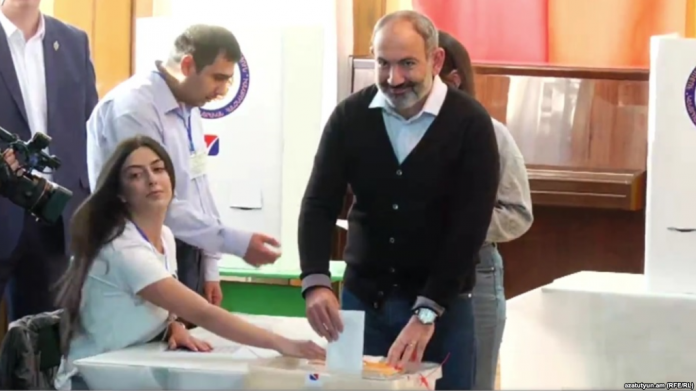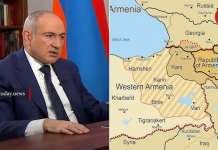At 8:00 AM on Sunday morning, polling stations across the Armenian capital opened their doors. A steady stream of enthusiastic voters walked through them to cast their ballots in the first significant election following the events of last spring’s Velvet Revolution. By the end of the day, almost four hundred thousand Yerevantsis voted in what many consider the first free and fair election since Independence. The Civil Contract party’s nominee, Hayk Marutyan, was elected Mayor with an astounding 81% of the vote. His victory has been interpreted by many as a vote of confidence for the newly-elected Prime Minister, Nikol Pashinyan. Coming in at a distant second, the Prosperous Armenia Party (PAP), with just under 7% of the vote, and fellow liberal party, Luys, at 5%. None of the other parties managed to pass the threshold necessary to gain seats in the Council of Elders.
The election was triggered by the July 9th resignation of Taron Margaryan, Yerevan’s controversial Mayor after seven years in office. His announcement followed the release of a damning investigative report on youtube linking the Mayor to organised crime. Margaryan became the latest in a series of Republican Party-affiliated government officials to fall from grace in peaceful Velvet Revolution’s wake.
Twelve parties and coalitions registered with the Central Election Commission before the official campaign kick off on the 10th of September. The roster included, amongst others, the ARF, the Prosperous Armenia party, Raffi Hovhannisyan Heritage party and Yerkir Tsirani, a party formed by former Heritage-member, and firebrand politician, Zaruhi Postandjyan. Most notably, Pashinyan’s Civil Contract party chose to run a separate campaign from its liberal parliamentary allies, the Luys party. The Republicans also refused to field a candidate for this election.
Civil Contract chose as its candidate, Hayk Marutyan, a well-known comedian and actor who had been sympathetic to opposition causes over the last several years. Critics of the nomination, however, painted Marutyan as a political neophyte with virtually no prior legislative experience. The fact that he had participated in opposition protests may have armed him with political ‘street cred’, but not necessarily the managerial expertise necessary to run a city of over a million inhabitants. This inexperience got the candidate into some hot water when he publicly described his campaign as a struggle between “the forces of light and forces of darkness”. This comparison received some sharp rebukes from opposing candidates, and a scandal was only averted when he publically retracted these comments.
Virtually every party’s campaign platforms included promises to overhaul transportation, protect public spaces, better manage subsidised housing and preserve historic buildings. In practice, little room was given to debate on these critical matters of urban management. Deliberation over corruption reduction and democratisation largely dominated the campaign. Yerevan’s status as Armenia’s political, economic and cultural capital almost guaranteed that the election would serve as a litmus test for the new post-Velvet government.
By all accounts, Election Day went so smoothly that it bordered on the mundane. With the Republican Party sitting this one out, gone were the taghi lav tgheke (The ‘good neighbourhood boys’ hired thugs that ensure the expected vote count), the black cars parked around polling stations, and the bribes. The Central Election Commission received only 129 complaints, (compared to 1618 recorded last year), most of which were minor. The most controversial of these involved a pizza delivery to a polling station.
The vote, which was open to all registered residents of Yerevan, regardless of citizenship, offered the opportunity for thousands of repatriated Armenians to cast their ballots for the first time since living in the Homeland. Many of them did; expressing their enthusiasm on social media.
With all the ballots counted, Civil Contract will receive 56 seats in the Council of Elders, while Prosperous Armenia and Luys will obtain 5 and four seats respectively. 33 seats are needed to form a majority.
Uncharacteristically for an Armenian election, no party challenged the validity of the vote, no candidate declared a boycott, and no disgruntled oppositionists called for street protests. In a surprising show of solidarity, Gagik Tsarukyan, Armenia’s richest man and head of the PAP, conceded defeat. The ARF, which was shut out of the council, hailed the vote as democratic, while the Luys candidate was quick to offer his congratulations in person to Marutyan.
Recent claims by former President Robert Kocharyan, (currently under investigation for treason) that a ‘silent majority’ of Armenia’s population supported him over Pashinyan were put to the test and decisively invalidated. Marukyan, who largely centred his campaign around his closeness to Pashinyan, secured the largest share of the vote in Yerevan’s electoral history.
Republican commentators have not swayed from their opinion that the Velvet Revolution represents the views of a vocal minority. According to them, enthusiasm for the new government didn’t quite materialise itself in the polls, citing the relatively low voter turnout. Detractors have rebuffed these assertions, pointing to the fact that this year’s turn out, 43% was 3% higher than the previous years, despite not including votes by the deceased or those who cast ballots despite being out of the country. On the contrary, many who had sat out previous elections went out to vote for the first time on Sunday.
With a stunning victory at the ballot box confirming the vote of confidence Pashinyan received on the streets, Armenia is beginning to transition away from direct action and towards establishment politics. For many of the young, ambitious activists swept into office over the weekend, this transition may prove challenging. Now armed with the legislative power to make the changes they previously called for from the streets, the time has come to tackle a legacy of mismanagement and corruption left over from the Margaryan days. More than a symbolic victory for Pashinyan, this election must yield tangible results for Yerevantsis, who are in desperate need of good governance, sustainable urban development, transportation systems reform, and clean air. As the people of Yerevan prepare to celebrate their city’s 2800th anniversary in just a few days, its new leaders must think of the city’s upcoming 1000 years. Hopefully, they’re up for the task. Raffi Elliot












